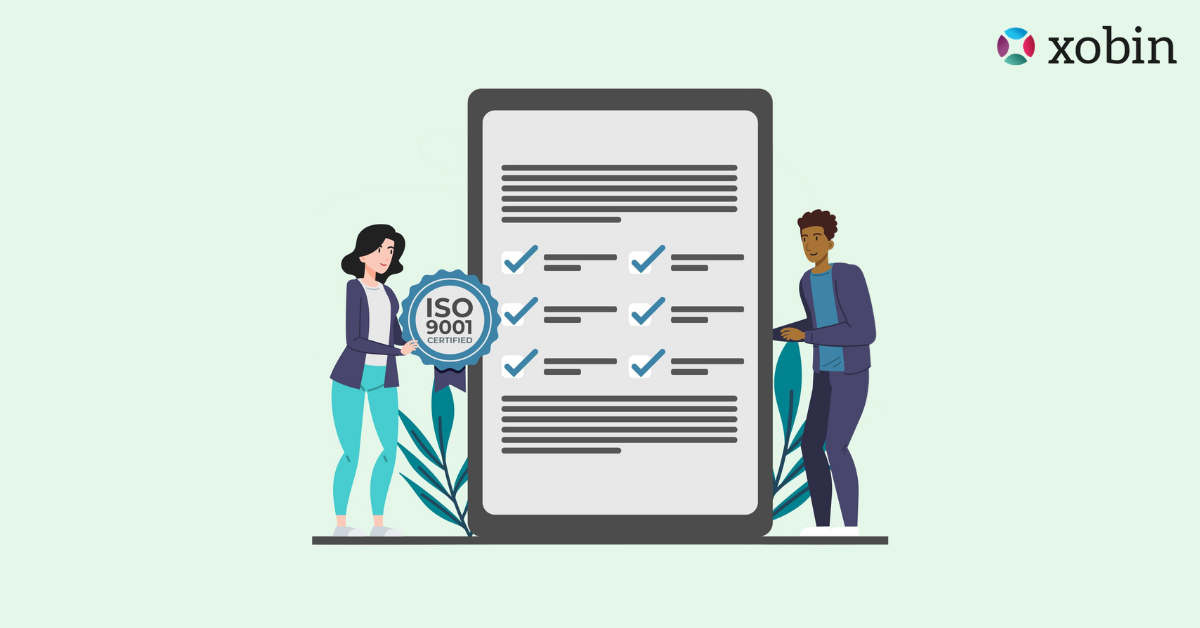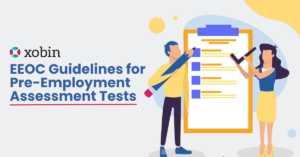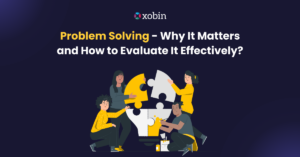Online assessments have revolutionized hiring by making candidate evaluation faster, more scalable, and data-driven. With remote evaluations becoming the new norm, leaders face challenges such as biased assessments, data privacy concerns, cheating risks, and inconsistent evaluation standards. However, as organizations embrace online hiring tools, ensuring fairness and compliance in online assessments has become a critical priority.
Table of Contents
From mitigating bias to meeting global data privacy laws, employers must take a structured approach to build trust and maintain integrity in their assessment processes. This blog explains how to build a fair, compliant and bias-free online assessment ecosystem while protecting candidate trust and organizational integrity.
TL;DR – Key Takeaways!
- Online assessments must ensure fairness, compliance, and unbiased evaluation to maintain trust and legal integrity.
- Fairness requires standardized testing conditions, bias-free questions, inclusive design, and regular AI fairness audits.
- Compliance demands adherence to GDPR, EEOC, ADA, ISO 27001, SOC2, accessibility standards and other global data and privacy regulations.
- Use AI proctoring, secure delivery controls, and accessibility features to prevent cheating and ensure equal opportunity.
- Maintain transparent communication about data usage, AI evaluation, and proctoring rules to build candidate trust.
- Conduct regular fairness, security, and compliance audits to avoid risks and detect bias patterns early.
- Ensure human oversight in all AI-driven assessments to maintain accuracy and accountability.
- Xobin ensures bias-free AI scoring, global compliance, audit-ready reports, proctoring security and accessibility for fair online hiring.
Importance of Fairness and Compliance in Online Assessments
Online assessments are now central to digital hiring, internal benchmarking and large-scale evaluations. However, fairness issues, regulatory complexities, and ethical concerns challenge traditional test delivery frameworks.
- Fairness in Online Assessments: Fairness ensures every candidate receives an equal opportunity to demonstrate skills, free from demographic, behavioral, or technological bias. When assessments are unfair or inconsistent, it damages employer reputation, increases legal risk, and leads to poor hiring decisions.
- Compliance in Online Assessments: With laws like GDPR, EEOC guidelines, and enterprise security mandates, organizations must ensure that assessment tools meet strict privacy, accessibility, and data-handling requirements.
Moreover, remote test-taking creates new risks like cheating, impersonation, device misuse, and data breaches, all of which require robust controls and transparent processes. As a result, HR leaders must adopt tools, policies, and AI frameworks that uphold integrity while preserving candidate experience.
SHRM reports that 78% of HR professionals say skills assessments improve the quality of their hires, and this clearly shows why fair and objective evaluation matters.
Moreover, EEOC and GDPR compliance are legal obligations that every hiring organization must meet.
Ensuring fairness and compliance builds:
- Trust among candidates.
- Credibility in your employer brand.
- Legal and ethical integrity across the recruitment funnel.

Key Elements of Fair and Compliant Online Assessments
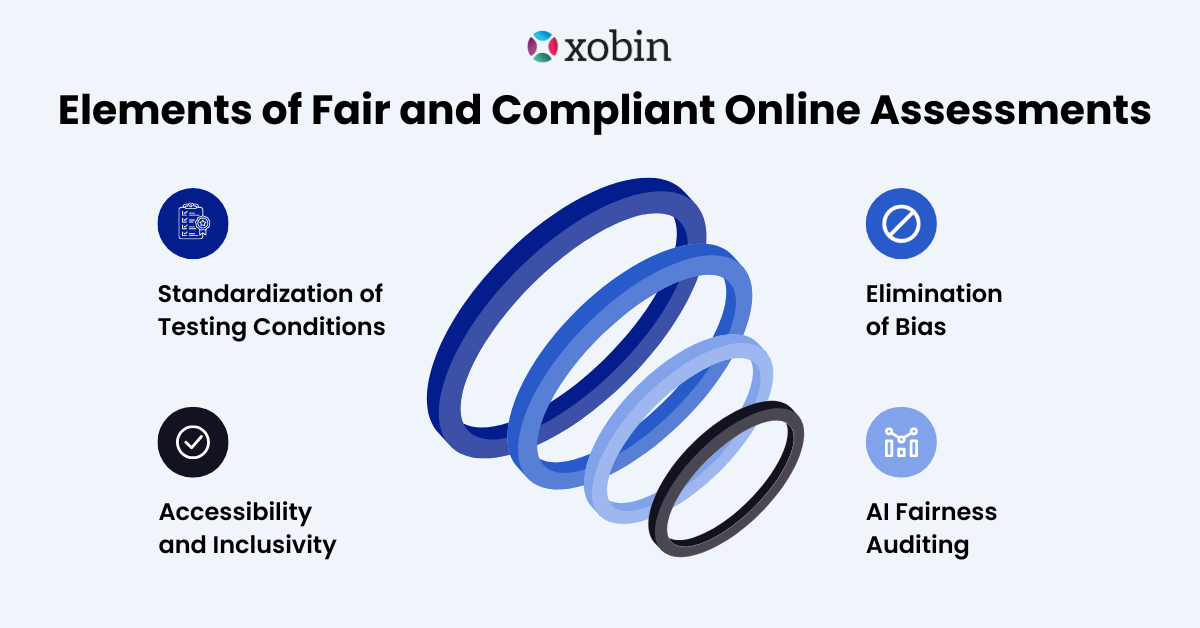
1. Standardization of Testing Conditions
All candidates should experience the same test structure, difficulty level, and instructions. Use time-bound assessments and uniform scoring rubrics to avoid subjective evaluations.
2. Elimination of Bias
Unconscious bias can creep into test design or interpretation. Use diverse data samples during test validation and remove culturally skewed or gendered questions.
3. Accessibility and Inclusivity
A fair test accommodates all candidates, including those with disabilities. Ensure assessments comply with WCAG accessibility guidelines and support assistive technologies.
4. AI Fairness Auditing
When using AI-driven talent assessments, conduct bias audits to ensure that algorithms don’t favor specific demographics. Regularly retrain AI models on diverse datasets.
Want to run secure, compliant, and bias-free online assessments? Power your hiring with Xobin today!
Book A DemoCompliance Requirements in Online Assessments
Ensuring compliance in online assessments involves adhering to both local and international regulations:
| Compliance Area | Key Regulation | Requirement |
| Data Privacy | GDPR, CCPA | Secure data storage, explicit consent, right to erasure |
| Equal Opportunity | EEOC, ADA | Non-discriminatory tests, accessibility for all candidates |
| Test Validation | APA Standards | Scientifically validated assessments for reliability |
| Proctoring Compliance | ISO/IEC 27001 | Secure monitoring and candidate verification |
Maintaining compliance requires continuous documentation, third-party audits, and transparent communication with candidates.
Building a Compliant Online Assessment Framework
1. Compliance with Global Data Regulations
Online assessments handle sensitive personal data such as identity, biometrics (via webcam), behavioral patterns, audio/video recordings, test responses, and more.
To remain compliant, organizations must adhere to frameworks like:
- GDPR: data minimization, explicit consent, erasure rights
- ISO 27001: information security management
- SOC2 Type-II: sustained security and audit controls
- EEOC Guidelines: fairness and anti-discrimination
- ADA/WCAG Standards: accessibility in assessments
Moreover, compliance requires not just certifications but demonstrable operational practices:
- Encrypted data transmission
- Access control and role-based visibility
- No long-term AI retention of evaluation data
- Consent-based proctoring
- Secure data center localization
Data privacy must be embedded at every step, including assessment creation, delivery, scoring, storage, and archival.
2. Ethical and Transparent Use of AI
AI enhances efficiency but also increases responsibility. Leaders must ensure:
- AI models avoid sensitive attributes (gender, race, accents).
- Human oversight exists for final decision-making.
- Scoring algorithms are auditable
- AI models undergo third-party fairness testing
- AI providers do not store assessment data for model training.
Ethical AI strengthens candidate trust, supports legal defensibility, and ensures unbiased evaluations across large-scale hiring.
Technologies that Strengthen Fairness and Compliance in Online Assessments
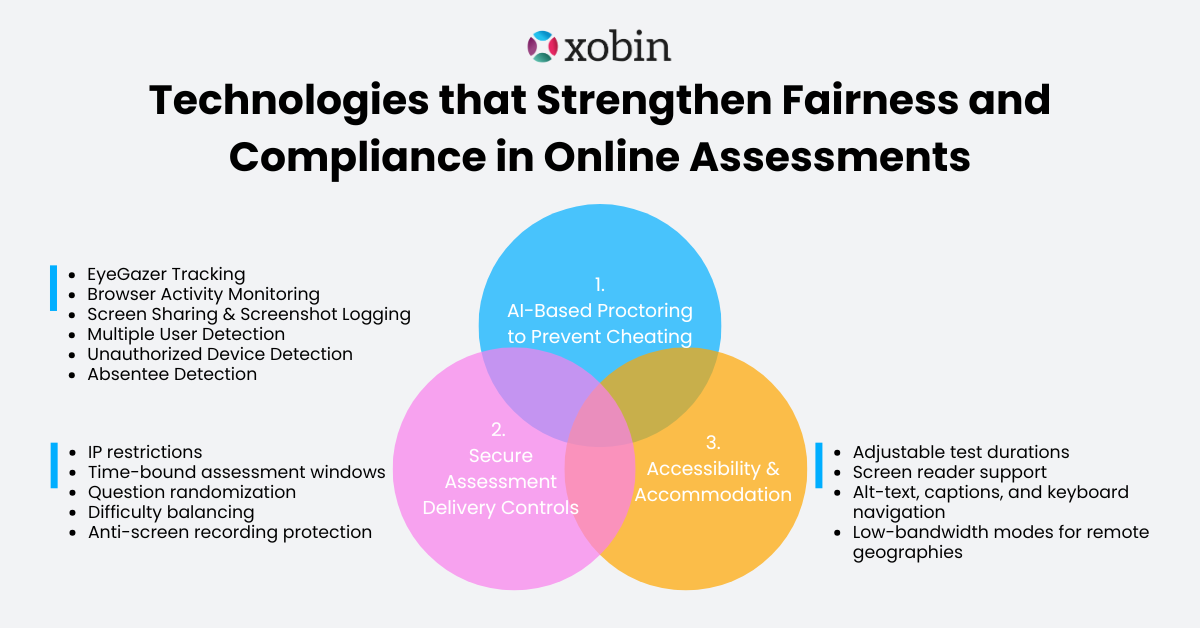
1. AI-Based Proctoring to Prevent Cheating
Ensuring fairness requires stopping unfair advantages during online tests. Xobin’s AI proctoring detects anomalies, including impersonation, resource use, and malpractice attempts.
Key capabilities include:
- EyeGazer Tracking
- Browser Activity Monitoring
- Screen Sharing & Screenshot Logging
- Multiple User Detection
- Unauthorized Device Detection
- Absentee Detection
2. Secure Assessment Delivery Controls
Compliance requires controlling how assessments are accessed and used.
Critical controls include:
- IP restrictions
- Time-bound assessment windows
- Question randomization
- Difficulty balancing
- Anti-screen recording protection
These prevent unauthorized sharing, assessment leaks, and identity fraud.
3. Accessibility & Accommodation
Fair assessments must support all users, including those with disabilities or varying access conditions.
Accessibility requirements include:
- Adjustable test durations
- Screen reader support
- Alt-text, captions, and keyboard navigation
- Low-bandwidth modes for remote geographies
Inclusive design not only ensures ADA/WCAG compliance but also builds a positive candidate experience.

Steps to Ensure Fairness and Compliance in Assessments
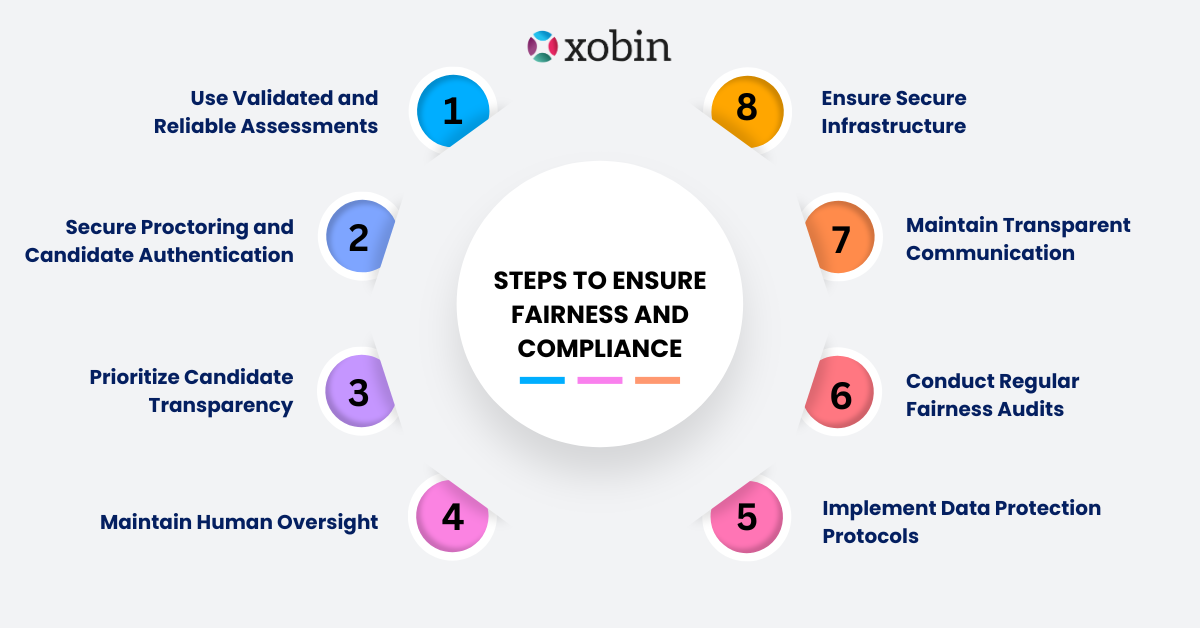
Use Validated and Reliable Assessments
Choose psychometrically validated tests that accurately measure job-related skills. Avoid using generic or untested question banks that may introduce bias.
Secure Proctoring and Candidate Authentication
Leverage AI-powered remote proctoring tools that ensure identity verification without invading privacy. Use real-time video monitoring and browser lockdowns ethically.
Prioritize Candidate Transparency
Inform candidates about:
- What data will be collected
- How AI will evaluate them
- How proctoring works
- Their privacy rights
Transparency builds trust while avoiding regulatory risk.
Maintain Human Oversight
Even with AI assistance, humans must guide final decisions. Human-AI hybrid evaluation ensures accuracy, empathy, and compliance with emerging AI regulations.
Implement Data Protection Protocols
Encrypt candidate data, limit access permissions, and provide clear privacy notices. Data handling should comply with GDPR and SOC 2 standards.
Conduct Regular Fairness Audits
Review demographic scoring patterns, accessibility obstacles, AI scoring consistency, and assessment difficulty levels. Quarterly audits can help detect disparities early.
Maintain Transparent Communication
Share assessment details, including purpose, format, and evaluation criteria, with candidates. Transparency reduces anxiety and enhances trust.
Ensure Secure Infrastructure
Use enterprise-grade security including:
- MFA & SSO
- Encryption
- Role-based access control
- Third-party penetration testing
- Geo-compliant data centers
These safeguards reduce organizational risk during large-scale assessment operations.
How Xobin Ensures Fairness and Compliance in Assessments
Xobin offers a fully compliant, fairness-focused online assessment platform designed for enterprises, universities, and global hiring teams.
- AI-Based Proctoring for Maximum Integrity
- Bias-Free and Transparent AI Evaluation
- Global Security and Compliance Certifications
- Advanced Data Privacy Protection
- Accessible, Scalable, and Audit-Friendly
Xobin empowers organizations to deliver secure, fair, and globally compliant assessments with AI-driven proctoring, audit-ready reports, transparent scoring, and world-class security certifications.
If you aim to build a trusted and bias-free digital hiring process, Xobin is your partner in transformation. Book a personalized demo with Xobin today and ensure fairness, trust, and compliance in every assessment.
FAQs
1. What makes an online assessment fair?
A fair online assessment is standardized, bias-free, accessible, and free from environmental advantages. It uses validated question sets, structured scoring, and transparent evaluation methods.
2. What role does AI play in ensuring fairness?
AI helps automate scoring and bias detection, but it must be regularly audited to ensure ethical decision-making.
3. What compliance standards apply to online assessments?
Key standards include GDPR, SOC2, ISO 27001, EEOC guidelines, and ADA/WCAG accessibility regulations.
4. Why is accessibility important in assessments?
Accessible assessments ensure inclusivity and compliance with disability laws, fostering a diverse and fair hiring process.
5. How do proctoring tools improve exam integrity?
AI proctoring detects cheating attempts such as multiple people in the frame, tab-switching, screen misuse, and device visibility, ensuring all candidates take assessments under uniform conditions.
6. How do organizations actively protect personal data privacy?
They use encrypted channels, strong access controls, smart anonymization, global data centers, and strict policies blocking long-term retention.
